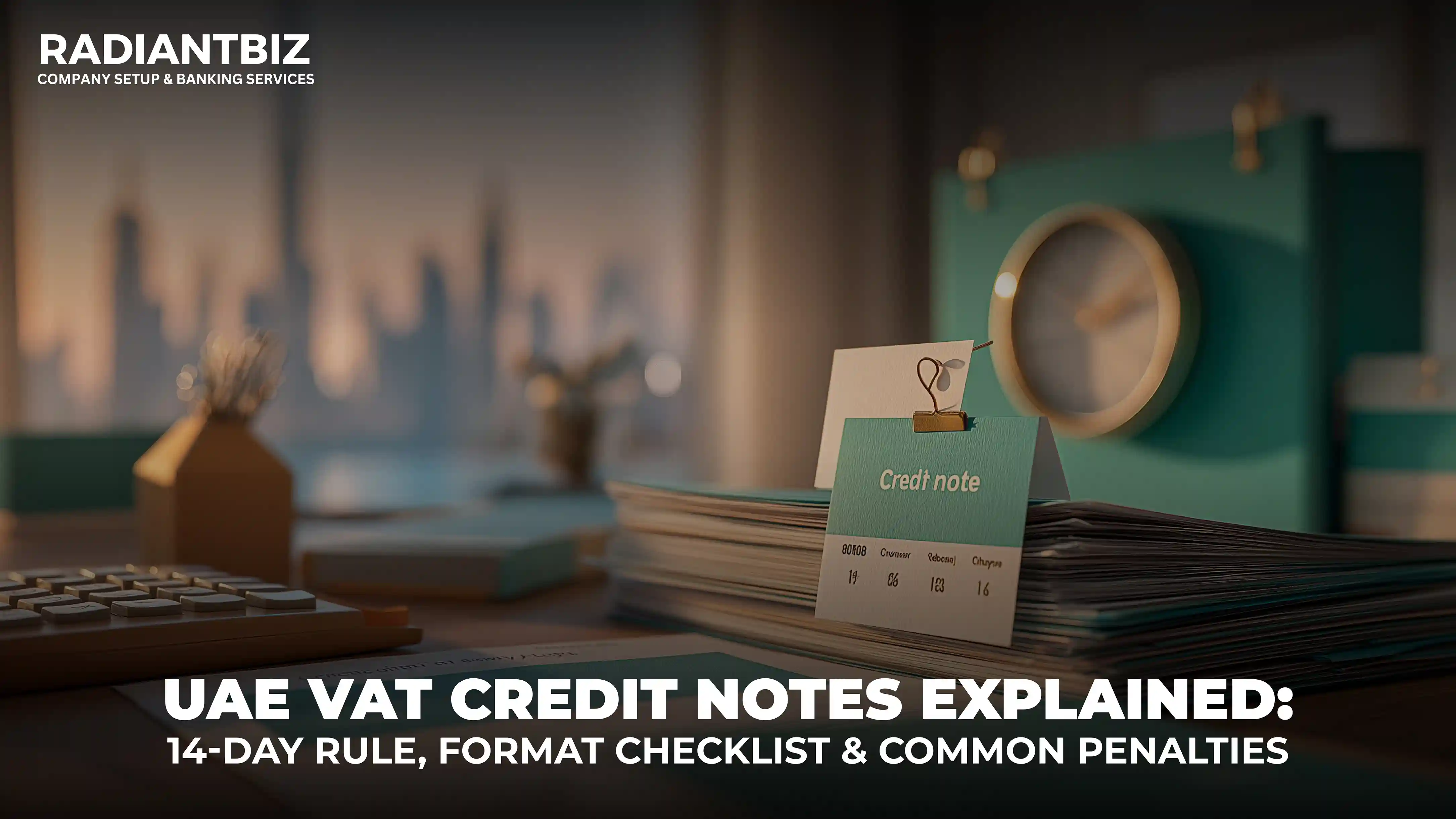How to Start Company in Dubai, UAE?


Table of Contents
To Start a Company in Dubai, it is a relatively straightforward process, but it requires careful planning and attention to several key factors. While Dubai offers a welcoming business environment, there are multiple steps you need to follow, which can be time-consuming. The process typically involves establishing the company, obtaining the necessary licenses, and adhering to Dubai's legal framework.
One of the first decisions you'll make is whether to set up in a free zone or on the mainland, as each option has distinct advantages depending on your business goals. For example, free zones offer tax exemptions and full foreign ownership, but mainland businesses can directly trade with the local market. It's important to weigh these options carefully to ensure they align with your business needs.
Many entrepreneurs choose to work with company setup experts to streamline the process and navigate the regulatory requirements. These professionals can help manage paperwork, offer strategic advice, and expedite the setup process, allowing you to focus on growing your business. After assisting thousands of entrepreneurs, it’s clear that enlisting help can save time and reduce the likelihood of costly mistakes.
Whether you're handling the setup yourself or seeking professional assistance, having a solid understanding of the financial, legal, and operational steps involved is essential. From securing the right trade license to understanding hidden costs such as office rent and visa fees, planning your finances and market entry strategy effectively will put you on a smooth path to success in Dubai.
Why Start Company in Dubai?
Starting a Company in Dubai offers several unique advantages that have made it a top destination for entrepreneurs worldwide. One of the key attractions is Dubai's tax benefits: businesses in the UAE enjoy 0% tax on personal and corporate income, making it highly appealing for startups. The only major tax is a 5% VAT, introduced in 2018, which is relatively low compared to global standards.
Dubai's booming economy is another major draw. It is home to the second-largest economy in the Arab world, providing ample opportunities for businesses across various industries such as healthcare, hospitality, trade, and technology. Entrepreneurs can tap into a highly diverse market and capitalize on the city's strategic position as a global trading hub.
Additionally, Dubai offers a high quality of life, ranked 23rd globally in the Best Countries Index. It boasts modern infrastructure, excellent healthcare, and a vibrant cultural scene, making it an attractive place not just for business but also for living.
For startups, Dubai has established incubators and funding initiatives to support new ventures. These resources, combined with Dubai's strong focus on innovation, help accelerate the growth of small and medium enterprises (SMEs). The city's free zones also offer perks like 100% foreign ownership, no import/export duties, and simplified processes for company setup.
The future outlook for businesses in Dubai is bright. The UAE is expected to outpace other Gulf economies in growth, providing further confidence for new businesses .
If you're considering setting up a company in Dubai, the process is streamlined, especially with assistance from local business setup services, ensuring that you can get your venture off the ground smoothly.
Benefits of Starting a Company in Dubai
Starting a company in Dubai has become a strategic move for entrepreneurs worldwide due to its unique advantages. Here’s why Dubai stands out as a top business destination:
1. Tax Benefits
One of the main attractions for company owners in Dubai is its favorable tax environment. Companies in the UAE enjoy 0% tax on personal and corporate income, an enticing benefit for startups and established businesses alike. The primary tax is a 5% VAT (introduced in 2018), which is relatively low compared to other countries, making Dubai a tax-friendly haven for entrepreneurs.
2. Booming Economy
Dubai boasts the second-largest economy in the Arab world, providing numerous opportunities across a wide range of industries, including healthcare, hospitality, trade, and technology. The city's diverse and dynamic market allows company to thrive by tapping into Dubai's position as a global trading hub. This economic strength and stability make Dubai a favorable location for businesses of all sizes.
3. World-Class Infrastructure and Quality of Life
Dubai is renowned for its high quality of life and ranks 23rd globally in the Best Countries Index. With state-of-the-art infrastructure, excellent healthcare, and a vibrant cultural scene, Dubai is not only an ideal business hub but also a great place to live. This quality of life attracts talent from around the world, making it easier for businesses to find skilled professionals.
4. Support for Startups and Innovation
Dubai has a strong focus on innovation and provides extensive support for startups. The city has established incubators, funding initiatives, and networking opportunities to help small and medium-sized enterprises (SMEs) grow. These resources are vital for startups looking to accelerate their company growth, making Dubai an appealing destination for innovative ventures.
5. Free Zone Advantages
Dubai’s free zones offer significant benefits to businesses, including:
- 100% foreign ownership
- Exemption from import/export duties
- Simplified company setup processes
These zones allow entrepreneurs to operate with complete control over their businesses while enjoying reduced administrative hurdles.
6. Strategic Global Location
Positioned at the crossroads of Europe, Asia, and Africa, Dubai serves as a gateway for trade. The city’s strategic location enables businesses to reach international markets with ease, making it ideal for companies involved in trade, logistics, and import/export operations.
7. Positive Future Outlook
Dubai’s economic outlook is strong, with the UAE expected to continue outpacing other Gulf economies in terms of growth. This positive trajectory instills confidence in new businesses, knowing that they are investing in a region with a promising economic future.
How to Start Company in Dubai?
If you're wondering how to start a company in Dubai, you’re on the right track! Dubai has quickly become a global hub for entrepreneurs due to its business-friendly environment and diverse economic sectors. From choosing the right industry to obtaining your business license, here’s everything you need to know to successfully start your business in Dubai.
1. Choose the Right Industry
Dubai offers a wealth of opportunities across industries, but selecting the right one is crucial. Each free zone in Dubai caters to specific sectors. For instance:
- Dubai International Financial Centre (DIFC) is a hub for finance giants, such as Goldman Sachs and Credit Suisse.
Consider proximity to related businesses and transport links. Free zones near airports or ports are ideal for import/export businesses. Keep in mind that some free zones are now more flexible, allowing businesses beyond their original industry focus.
2. Decide on a Location: Mainland or Free Zone?
Dubai offers two main company setup options: mainland and free zones. Here’s a quick comparison:
Free Zone Benefits:
- 0% corporate and personal tax
- 100% company ownership and profit repatriation
- No currency restrictions
- Import/export tax exemptions
Mainland Benefits:
- Direct trade with the UAE local market
- Freedom to operate without a mainland partner in some professional sectors (for certain activities)
If you choose the mainland, you may need a local partner who holds 51% of your company shares. RadiantBiz offers a Local Corporate Nominee Shareholder to help foreign entrepreneurs retain operational control while meeting legal requirements.
3. Choose a Legally Acceptable Company Name
Dubai has specific guidelines for naming companies. Here are a few rules:
- Avoid offensive or religious terms.
- If using a personal name, it must be the full name of a partner or owner (no initials).
- Avoid names associated with political organizations (e.g., FBI, Mafia).
4. Complete the Incorporation Paperwork
At this point, you’ll need to gather and submit various documents:
- Application forms for your company name and business activities
- Passport copies for shareholders
- Additional documents like a company plan or Non-Objection Certificate (NOC) if required by your chosen free zone
For mainland companies, you may need to declare your capital requirements in a Memorandum of Association.
5. Obtain Your Company License
Once approved, your company license will be issued. You’ll need to provide basic documents such as:
- Completed application form
- Passport copies of shareholders
- Business plan (for certain free zones)
6. Open a Business Bank Account
A corporate bank account is essential for operations in Dubai. The UAE hosts numerous banks, including:
- Local: Emirates NBD, Abu Dhabi Commercial Bank, Noor Bank
- International: HSBC, Citibank, Barclays
Banks may take 2-4 weeks to open an account. They’ll assess your business activities, anticipated transactions, and main customers.
7. Apply for Your Visa
This final step includes obtaining a visa for yourself and, if needed, your employees or dependents. Free zones have specific quotas for visa applications, whereas mainland companies face no such restrictions.
The visa application involves four key steps:
- Entry permit
- Status adjustment
- Medical fitness test
- Emirates ID issuance and visa stamping
With your license, bank account, and visa in place, you’re set to begin your entrepreneurial journey in Dubai!
Start Your Company Based on Jurisdiction
Dubai offers three primary options for setting up a company, each tailored to different business needs: Mainland, Free Zone, and Offshore setups.
Free Zone Company Setup
Free zones in Dubai offer significant benefits such as 100% foreign ownership, tax exemptions (including corporate and income taxes), and no import/export duties. These zones provide a well-regulated business environment with excellent infrastructure and sector-specific facilities. Free zone companies are ideal for businesses that aim to engage in international trade, technology, or logistics and do not need to trade directly within the UAE mainland.
Mainland Business Setup
Mainland companies can operate freely across the UAE and engage directly with the local market. They also have the flexibility to expand into other free zones, and bid for government contracts. Recent changes in UAE law now allow for 100% foreign ownership in many sectors, eliminating the need for local sponsors. Mainland setups are ideal for businesses focused on local trading, hospitality, or services that require direct engagement with consumers
Offshore Business Setup
Offshore companies in Dubai are suited for international trading and investment activities outside the UAE. They benefit from 100% foreign ownership, asset protection, and favorable tax policies. Offshore businesses are restricted from conducting business within the UAE but can own property and act as holding companies for other UAE-based entities. This setup is particularly useful for those looking for a cost-effective structure with minimal overhead
Each jurisdiction has its advantages based on your business goals, with free zones offering specialized hubs, mainland giving full access to the UAE market, and offshore setups providing international asset protection and tax benefits.
Documents Required to Start Company in Dubai
If you’re planning to start a Company in Dubai, ensuring that you have the necessary documentation is crucial for a smooth setup process. Here's a breakdown of the essential documents you'll need:
1. Passport Copies
- You’ll need copies of the passports of all key participants, including shareholders, directors, and any authorized managers involved in the business.
2. Passport-Sized Photographs
- Provide recent, high-quality photographs that meet the UAE government’s specifications for clarity and size. These are typically required for each shareholder and company representative.
3. Completed Application Form
- Fill out an application form that includes details on the business activity, partners, and other essential information. This form is a key requirement for establishing your business.
4. Memorandum of Association (MoA)
- If your company involves multiple shareholders, you’ll need an MoA, which outlines the company’s structure, roles, responsibilities, and ownership shares. The document must be notarized by a UAE notary.
5. Local Sponsor Agreement (for Mainland Companies)
- For businesses set up in the mainland, a local sponsor agreement is required. This document outlines the relationship with a local sponsor or service agent, who often holds 51% of the business ownership for foreign investors unless an exception applies.
6. Proof of Residence
- Include proof of residence for the business owner(s) and shareholders, such as a utility bill or rental contract. This confirms the residency status and addresses of the key stakeholders.
7. Business Plan
- A comprehensive business plan is essential, particularly for free zone companies. The plan should outline your business model, goals, and strategies, helping authorities understand your business's scope and objectives.
Additional Requirements
- Depending on your business activities, additional approvals from relevant government authorities may be required. For example, certain sectors like healthcare or finance may require permissions from regulatory bodies.
Offshore Business Setup Requirements
- If setting up an offshore business, the documentation requirements are generally less stringent. However, you will still need to submit identification and other legal documents to the relevant authorities.
Where to Submit Your Documents
- For mainland businesses, documents are typically submitted to the Department of Economic Development (DED). For free zone companies, submit your documents to the specific free zone authority where you’re setting up your business.
What is the Cost to Start Company in Dubai and the UAE?
Starting a Company in Dubai can be both rewarding and cost-effective, especially with a clear understanding of the cost of starting a company in Dubai. This guide will break down the primary costs associated with mainland business setup and LLC formation in Dubai, providing insight into the fees for a Dubai Commercial License and Dubai Professional License.
Mainland Business Setup / LLC Company Formation Costs
To legally operate a mainland business or an LLC in Dubai, you’ll need to obtain either a Commercial License or a Professional License. Let’s dive into the key costs associated with each type:
Dubai Commercial License Cost
A Commercial License is essential for businesses engaged in commercial activities, trading, or retail. Here are the associated costs:
- Initial Approval (one-time government fee): AED 120
- Name Approval (one-time government fee): AED 620
- Tasheel Fee (one-time government fee): AED 230
- Notarization of MOA (Memorandum of Association) (one-time government fee): AED 1,500
- License Fee (annual government fee): Approximately AED 10,000
- Market Fees: Previously, businesses were charged 2.5% of the annual rent as market fees, but this has now been exempted, with only a yearly AED 500 fee remaining for some businesses.
Dubai Professional License Cost
A Professional License is required for businesses offering professional services, such as consultancy, legal, or other specialized services. Here’s the breakdown of costs:
- Initial Approval (one-time government fee): AED 120
- Name Approval (one-time government fee): AED 620
- Tasheel Fee (one-time government fee): AED 230
- Notarization of MOA (one-time government fee): AED 900
- License Fee (annual government fee): Approximately AED 5,600
- Foreign Name Charges: AED 2,000 per year (This charge applies if you choose a non-Arabic business name, as Arabic names can avoid this fee.)
Additional Considerations
These costs represent the core expenses of establishing a mainland business in Dubai. However, it’s important to note that prices can vary based on government regulations and specific business needs. Seeking assistance from business setup experts can provide tailored advice to help streamline the setup process while optimizing costs.
With a clear understanding of the cost of starting a business in Dubai, entrepreneurs can confidently proceed with their mainland or LLC formation, leveraging Dubai’s thriving market and strategic location for business success.
Conclusion: How to Start a Business in Dubai
Starting a business in Dubai is an incredible opportunity, offering a world-class business environment, tax advantages, and access to global markets. To begin, choose the right business activity and structure—whether a mainland company, free zone entity, or offshore setup. Conduct thorough market research to align your goals with Dubai’s thriving sectors, like e-commerce, real estate, or consultancy. Next, secure the necessary trade license based on your business activity, such as a general trading license or consultancy license. Prepare all required documentation, including passport copies, visa approvals, and legal certifications.
Partnering with expert business consultants can simplify the process, ensuring compliance with Dubai’s legal frameworks. With the right planning and guidance, you can establish a strong foothold in this dynamic market.
Ready to take the first step? Dubai’s vibrant economy and infrastructure await your entrepreneurial vision—start building your dream business today!
FAQ : Start Company in Dubai
How much money is required to start a Company in Dubai?
The investment amount for starting a Company can vary depending on the business type, location, and sponsor's approval. Generally, you should plan to invest anywhere from AED 50,000 to AED 300,000 or more.
Can I start a small company in Dubai?
Starting a small company in Dubai and the UAE can be affordable. You can get a trading license for as low as AED 20,000. To be safe, budget between AED 20,000 and AED 30,000. Keep in mind that if you need additional perks or privileges, the cost of your business license may increase.
What are the Cheapest Free Zones in the UAE?
International Free Zone Authority (IFZA) Located in Dubai's Silicon Oasis, IFZA is a competitive free zone offering attractive benefits for businesses
.Ras Al Khaimah Free Zone (RAKEZ) RAKEZ is a popular choice for businesses due to its favorable conditions and supportive environment.
Ajman Media City Ajman Media City provides excellent opportunities for media-related businesses looking to establish themselves in the UAE.
Sharjah Media City Free Zone (SHAMS)SHAMS is a dynamic free zone in Sharjah, ideal for media and creative businesses.
Can a foreigner start a company in Dubai?
Yes, Dubai welcomes foreign investors and business owners. The emirate has numerous company formation experts and setup agents to guide foreign entrepreneurs through the licensing, visa, and business incorporation processes.
How can I start my own company in Dubai?
Steps to Establish Your Company in the UAE Mainland:1. Identify the Nature of Your Business Activity.2. Determine Your Company's Legal Structure.3. Reserve the Trade Name. 4. Apply for Initial Approval.5. Create LSA or MOA.6. Choose Your Business Location.7. Apply for Additional Government Approvals.
Can you own 100% of a company in Dubai?
Yes, Dubai Economy allows full ownership for foreign investors under the Federal Decree-Law No. 26 of 2020, which amended provisions of Federal Law No. 2 of 2015 on Commercial Companies.
Is Dubai good for starting a business?
Yes, Dubai has a stable economy built on commerce, tourism, real estate, and financial services. It is a hub for international trade and business, offering economic resilience even during global financial instability.
Can Indians open a company in Dubai?
Yes, Indian citizens can own 100% of a company in Dubai's free zones. Recent legal changes also permit 100% foreign ownership in certain mainland sectors.
Is it necessary to be physically present in Dubai to start a business?
No, it is not necessary to be physically present in Dubai to start a business. However, certain procedures might require a visit, and establishing a physical presence can be beneficial.
Can I do small business in Dubai?
Yes, you can start a small business in Dubai with a trading license costing between AED 20,000 and AED 30,000. However, additional perks or privileges may increase the cost.
What business can I start with AED 50,000 in Dubai?
E-commerce Store: The rise of online shopping makes e-commerce a lucrative option. With AED 50,000, you can set up a professional online store, invest in initial product inventory, and cover marketing expenses.
Can I move to Dubai if I start a business?
Yes, after establishing your company, you can apply for an investor visa. Once approved, you can relocate to Dubai and manage your business while enjoying residency benefits.
Which city in Dubai is best for business?
Best Places to Start a New Business in Dubai Mainland:- Business Bay- Deira- Sheikh Zayed Road- Dubai Internet City (DIC)- Jebel Ali Free Zone (JAFZA)- Dubai Multi Commodities Centre (DMCC)
How much money do I need to start a business in the UAE?
Businesses typically need to allocate between AED 50,000 to AED 300,000 or more. For example, a service-based company may require a minimum investment of AED 18,500.
Which business is best in Dubai?
Top 10 Profitable Business Ideas in Dubai:1. Construction Industry2. E-Commerce and Online Business3. Tourism Industry4. Real Estate Sector5. Healthcare Sector6. Professional Maintenance Services7. Consultancy Services8. Beauty and Personal Care Industry



2.png)




.avif)